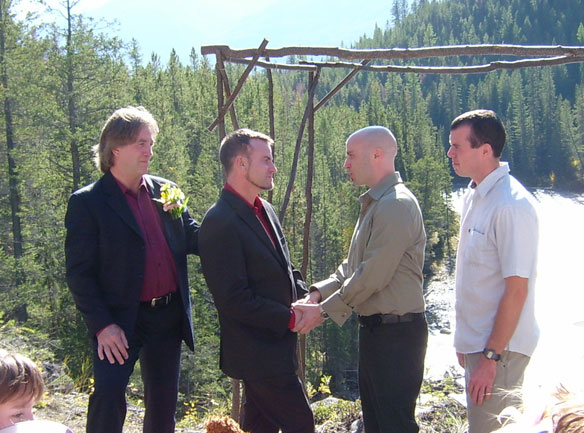
Above: An event the Canadian government now says never took place.
I woke up this morning to a text message from my husband suggesting I look at the news on same-sex marriage coming out of Canada. “They are a bit concerning,” he said.
Turns out he might not be my husband after all.
Lawyers representing the Canadian Department of Justice are arguing in a Court case that non-residents who married in Canada since 2004 are not legally married if they could not have been married in their country of residence.
Brent and I were married in British Columbia on 25 September 2004.
The case arises out of a peculiarity that those of us who were married in Canada have been aware of for some time: it’s easy enough to go to Canada and get married, but not so easy, when and if the time comes, to get divorced.
Canada’s divorce law carries a one-year residency requirement: to get divorced in Canada, one or both of the parties must have resided for at least 12 months in the province where the divorce is being sought. If you live outside Canada, you are supposed to get divorced in your home country. But that’s of little use if your home country doesn’t recognise your Canadian marriage. Australia, for example.
The case before the Court concerns an unidentified lesbian couple who married in Canada in 2005 and separated in 2009. One of the two lives in Florida, the other in the UK, both places where same-sex marriage is not explicitly recognised. They are seeking a divorce from the Canadian courts (the news reports don’t mention which court the matter is before) and the Canadian government is the respondent in the case.
A submission from the Department of Justice apparently argues that “in order for a marriage to be legally valid under Canadian law, the parties to the marriage must satisfy both the requirements of the place where the marriage is celebrated … and the requirements of the law of domicile of the couple with regard to their legal capacity to marry one another.”
In other words, if you can’t get married in your home country, you can’t get married in Canada either.
The couple are also seeking $30,000 in compensation from the provincial government, for negligent misrepresentation, in the case that their marriage is found to be invalid, which suggests that the government’s response didn’t entirely come out of the blue for their lawyer, like it did for the rest of us. They are reportedly represented by Martha McCarthy, a Canadian barrister who fought the Supreme Court case that legalised same-sex marriage across Canada in 2005.
McCarthy told the Globe and Mail:
It is offensive to their dignity and human rights to suggest they weren’t married or that they have something that is a nullity. It is appalling and outrageous that two levels of government would be taking this position without ever having raised it before, telling anybody it was an issue or doing anything pro-active about it,” she said. “All the while, they were handing out licences to perform marriages across the country to non-resident people.
The response to the news has been one of shock. US sex advice columnist Dan Savage was married in Vancouver in 2005. He has written an extensive blog post on the developments, and is quoted in the Globe and Mail as saying, “When I got out of bed, I was a married man and as soon as I got on my Twitter feed I realized I had been divorced overnight.”
It’s an odd position for the Canadian government to take. The conservatives are currently in power in Canada, but they have said – and Prime Minister Stephen Harper has reiterated today – that they have no plans to revisit the issue. I share Savage’s hopes that “Hopefully this is just one rogue lawyer or two and not policy of Canada’s Conservative government. If it is Canada’s Conservative government then the issue has definitely been re-opened.”
UPDATE, just before posting: Dan Savage has tweeted that the decision appears to have been reversed. No details yet but I’ll add them as they come in.
UPDATE, 06:30 on 14 January: The Canadian Justice Minister has said all same-sex marriages performed in Canada are legally recognised and the government is working to ensure foreign couples married in Canada have access to divorce.
Edited, 08:54 (added quote from Martha McCarthy)

